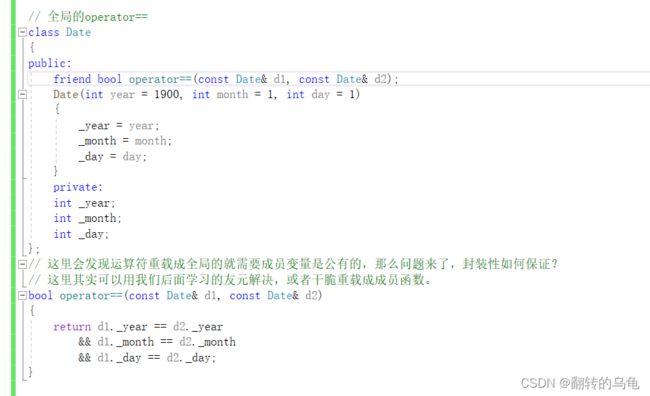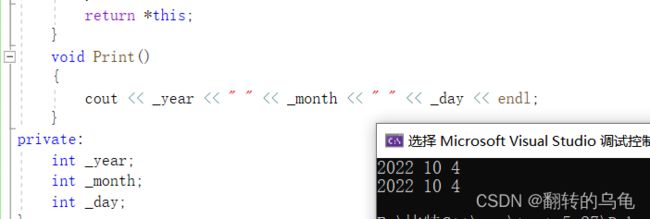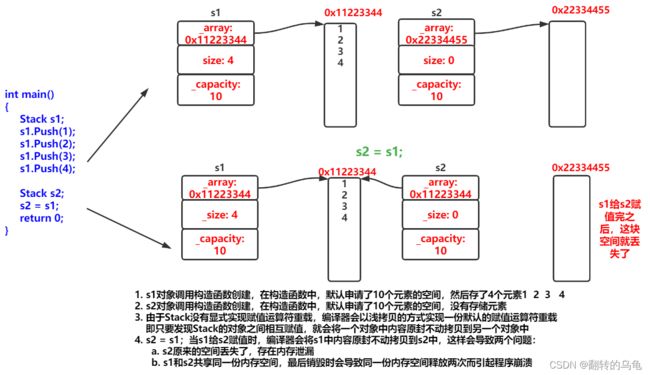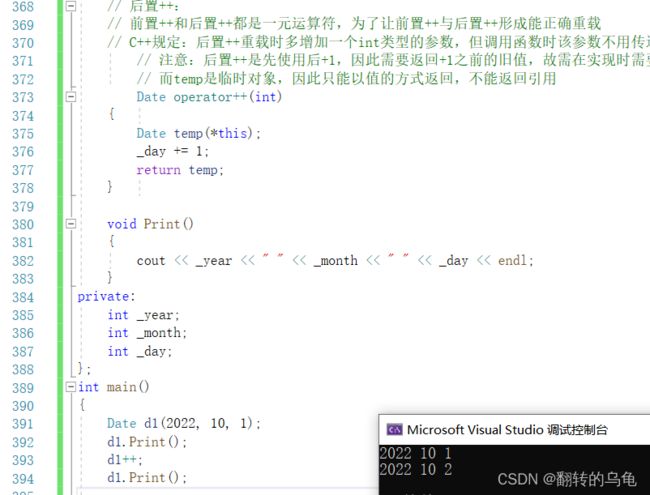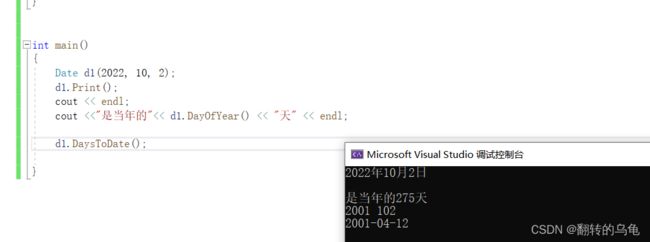【C++】类和对象(中)
类和对象(中)
- 一、类的六个默认成员函数
- 二、构造函数
-
- 2.1、什么是构造函数
- 2.2 构造函数的特性
- 三、析构函数
-
- 3.1、什么是析构函数
- 3.2、 析构函数的特性
- 四、拷贝构造函数
-
- 4.1、什么是拷贝构造
- 4.2、拷贝构造函数的特性
- 五、赋值运算符重载
-
- 5.1、运算符重载
- 5.2、赋值运算符重载
- 5.3、前置++运算符和后置++运算符重载
- 六、日期类完整代码
- 七、const成员函数
- 八、取地址及const取地址操作符重载
一、类的六个默认成员函数
如果一个类中什么成员都没有,简称为空类。
其实在空类中并不是什么都没有,任何类在什么都不写时,编译器会自动生成以下6个默认成员函数。
默认成员函数: 用户没有显式实现,编译器会自动生成的成员函数称为默认成员函数。

二、构造函数
2.1、什么是构造函数
当我们在使用类来初始化一个对象时,通常都需要调用他的Init公有方法给对象进行初始化。未免有点麻烦,那能否在对象创建时,就将信息设置进去呢?
构造函数是一个特殊的成员函数,名字与类名相同,创建类类型对象时由编译器自动调用,以保证每个数据成员都有 一个合适的初始值,并且在对象整个生命周期内只调用一次。
构造函数有如下特性:
- 函数名与类名相同。
- 无返回值。
- 对象实例化时编译器自动调用对应的构造函数。
- 构造函数可以重载。
- 如果类中没有显式定义构造函数,则C++编译器会自动生成一个无参的默认构造函数,一旦用户显式定义编译器将不再生成。
- 构造函数对内置类型不做处理,对于自定义类型会调用他的默认构造函数。
- 无参的构造函数和全缺省的构造函数都称为默认构造函数,并且默认构造函数只能有一个。注意:无参构造函数、全缺省构造函数、我们没写编译器默认生成的构造函数,都可以认为是默认构造函数。
class Date
{
public:
void Init(int year, int month, int day)
{
_year = year;
_month = month;
_day = day;
}
void Print()
{
cout << _year << "-" << _month << "-" << _day << endl;
}
private:
int _year;
int _month;
int _day;
};
int main()
{
Date d1;
d1.Init(2022, 7, 5);
d1.Print();
Date d2;
d2.Init(2022, 7, 6);
d2.Print();
return 0;
}
对于Date类,可以通过 Init 公有方法给对象设置日期,也可以调用他的构造函数来构造对象

我们可以看到编译器帮助我们自动调用了构造函数,而构造函数的功能就是帮助我们初始化对象,下面我们来看一下构造函数的几大特性。
2.2 构造函数的特性
构造函数是特殊的成员函数,需要注意的是,构造函数虽然名称叫构造,但是构造函数的主要任
务并不是开空间创建对象,而是初始化对象
构造函数的特征如下:
- 函数名与类名相同。
- 无返回值。
- 对象实例化时编译器自动调用对应的构造函数。
- 构造函数可以重载。
- 如果类中没有显式定义构造函数,则C++编译器会自动生成一个无参的默认构造函数,一旦 用户显式定义编译器将不再生成
class Date
{
public:
如果用户显式定义了构造函数,编译器将不再生成
//Date(int year, int month, int day)
//{
//_year = year;
//_month = month;
//_day = day;
//}
void Print()
{
cout << _year << "-" << _month << "-" << _day << endl;
}
private:
int _year;
int _month;
int _day;
};
int main()
{
Date d1; //屏蔽有参构造参数 编译器自动生成无参构造
//Date d2(2022, 5, 20);
类内有有参构造参数,编译器不再自动生成无参构造,
调用走有参构造 无参调用失败
可以显示写无参构造,这样有参无参均可调用
return 0;
}
关于编译器生成的默认成员函数,很多人会有疑惑:不实现构造函数的情况下,编译器会
生成默认的构造函数。但是看起来默认构造函数又没什么用?d对象调用了编译器生成的默
认构造函数,但是d对象_year/_month/_day,依旧是随机值。也就说在这里编译器生成的 默认构造函数并没有什么用??
解答:C++把类型分成内置类型(基本类型)和自定义类型。内置类型就是语言提供的数据类
型,如:int/char…,自定义类型就是我们使用class/struct/union等自己定义的类型,看看
下面的程序,就会发现编译器生成默认的构造函数会对自定类型成员_t调用的它的默认成员 函数。
class Time
{
public:
Time()
{
cout << "Time()" << endl; //打印看是否自动调用Time()
_hour = 0;
_minute = 0;
_second = 0;
}
private:
int _hour;
int _minute;
int _second;
};
class Date
{
private:
// 基本类型(内置类型)
int _year=2022;
int _month=3; //这里使用了特性六,在类的声明中给默认值
int _day=15;
// 自定义类型
Time _t;
};
int main()
{
Date d;
return 0;
}
运行上面的代码,我们可以发现Data类构造对象的时候自动调用了Time的构造函数。
- 内置类型成员变量在类中声明时可以给默认值。
- 无参的构造函数和全缺省的构造函数都称为默认构造函数,并且默认构造函数只能有一个。注意:无参构造函数、全缺省构造函数、我们没写编译器默认生成的构造函数,都可以认为是默认构造函数
class Date
{
public:
//Date()
//{
// _year = 1900;
// _month = 1;
// _day = 1;
//}
Date(int year = 1900, int month = 1, int day = 1)
{
_year = year;
_month = month;
_day = day;
}
void Print()
{
cout << _year << "-" << _month << "-" << _day << endl;
}
private:
int _year;
int _month;
int _day;
};
int main()
{
Date d1;
Date d2(2022, 9, 25);
d2.Print();
d1.Print();
}
三、析构函数
3.1、什么是析构函数
一个对象是由构造函数初始化的,那么是怎么没的呢?与构造函数功能相反,析构函数不是完成对对象本身的销毁,局部对象销毁工作是由编译器完成的。而对象在销毁时会自动调用析构函数,完成对象中资源的清理工作。
3.2、 析构函数的特性
析构函数是特殊的成员函数,其特征如下:
- 析构函数名是在类名前加上字符 ~。
- 无参数无返回值类型。
- 一个类只能有一个析构函数。若未显式定义,系统会自动生成默认的析构函数。注意:析构
函数不能重载 - 对象生命周期结束时,C++编译系统系统自动调用析构函数
- 关于编译器自动生成的析构函数,是否会完成一些事情呢?下面的程序我们会看到,编译器
生成的默认析构函数,对自定类型成员调用它的析构函数。
class Time
{
public:
Time()
{
cout << "Time()" << endl; //打印看是否自动调用Time()
_hour = 0;
_minute = 0;
_second = 0;
}
~Time()
{
cout << "~Time()" << endl;
}
private:
int _hour;
int _minute;
int _second;
};
class Date
{
public:
Date(int year = 1900, int month = 1, int day = 1)
{
_year = year;
_month = month;
_day = day;
}
void Print()
{
cout << _year << "-" << _month << "-" << _day << endl;
}
~Date()
{
cout << "~Date()" << endl;
}
private:
int _year;
int _month;
int _day;
Time _time;
};
int main()
{
Date d1;
Date d2(2022, 9, 25);
d2.Print();
d1.Print();
//结束后自动调用析构,同时调用TIme的析构
}
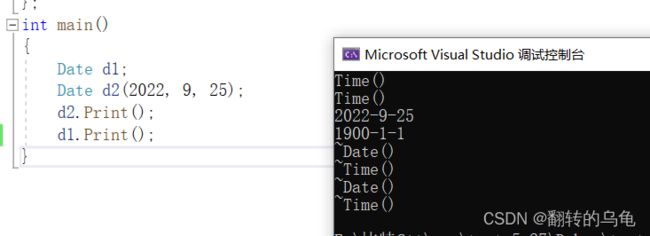
6. 如果类中没有申请资源时,析构函数可以不写,直接使用编译器生成的默认析构函数,比如Date类;有资源申请时,一定要写,否则会造成资源泄漏,比如Stack类。
四、拷贝构造函数
4.1、什么是拷贝构造
在创建对象时,我们可以创建一个与已存在的对象一摸一样的新对象,那么这个功能就由我们的拷贝构造函数来完成。
拷贝构造函数:只有单个形参,该形参是对本类类型对象的引用(一般常用const修饰),在用已存 在的类类型对象创建新对象时由编译器自动调用。
class Time
{
public:
Time()
{
cout << "Time()" << endl; //打印看是否自动调用Time()
_hour = 0;
_minute = 0;
_second = 0;
}
~Time()
{
cout << "~Time()" << endl;
}
private:
int _hour;
int _minute;
int _second;
};
class Date
{
public:
Date(int year = 1900, int month = 1, int day = 1)
{
_year = year;
_month = month;
_day = day;
}
Date(const Date&a)
{
_year = a._year;
_month = a._month;
_day = a._day;
_time = a._time;
}
void Print()
{
cout << _year << "-" << _month << "-" << _day << endl;
}
~Date()
{
cout << "~Date()" << endl;
}
private:
int _year;
int _month;
int _day;
Time _time;
};
int main()
{
Date d1(2022, 9, 25);
Date d2(d1); //调用拷贝构造函数
d1.Print();
d2.Print();
}
4.2、拷贝构造函数的特性
拷贝构造函数也是特殊的成员函数,其特征如下:
- 拷贝构造函数是构造函数的一个重载形式
- 拷贝构造函数的参数只有一个且必须是类类型对象的引用,使用传值方式编译器直接报错,因为会引发无穷递归调用。
- 若未显示定义,编译器会生成默认的拷贝构造函数。 默认的拷贝构造函数对象按内存存储按字节序完成拷贝,这种拷贝叫做浅拷贝,或者值拷贝。
- 默认的拷贝构造函数对内置类型以字节为单位直接进行拷贝(浅拷贝),对自定义类型调用其自身的拷贝构造函数。

拷贝构造函数的参数只有一个且必须是类类型对象的引用,使用传值方式编译器直接报错,因为会引发无穷递归调用。 为什么呢?
传值会引发无限递归!!!
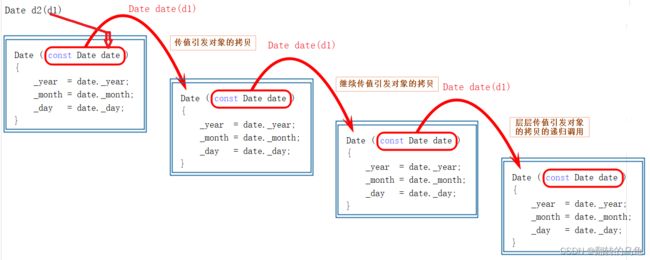
所以我们必须使用引用来做形参,这样的话在调用拷贝构造的时候,形参就是实参自己,那么就不需要再拷贝一份实参,拷贝构造函数直接就可以完成对待初始化对象的初始化。当然,我们在写拷贝构造函数的时候,一般都在前面加const,这样就可以避免对原对象的修改。
下面来说一下什么是深拷贝 什么是浅拷贝!
浅拷贝就是值拷贝,就是你有什么我拷贝什么,不管结果如何
深拷贝就是浅拷贝的加强,考虑到有些资源具有唯一性,比如类,你拷贝了我的堆资源,我释放后,正常来说就结束了
结果你又释放一次,这就是浅拷贝的危害,深拷贝就是在值拷贝的基础上,像拷贝对象意义拷贝一份新的资源,而不是旧有的!!
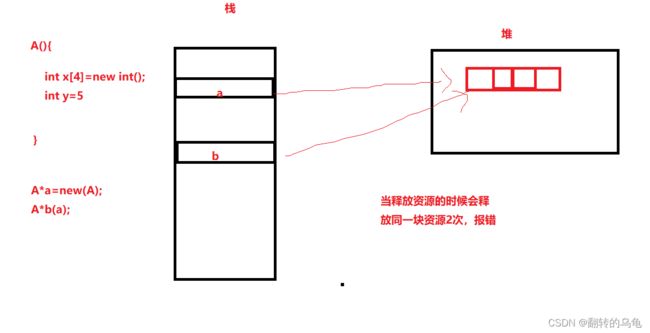
此时默认拷贝构造函数的弊端就出现了,就必须我们手写拷贝构造,给构造出来的对象开辟资源。
typedef int DataType;
class Stack {
public:
//构造函数
Stack()
{
cout << "构造函数Stack()" << endl;
_array = (DataType*)malloc(sizeof(DataType) * 3);
if (!_array)
{
perror("malloc fail::");
exit(-1);
}
_capacity = 3;
_top = 0;
}
//...
//析构函数
~Stack()
{
cout << "析构函数~Stack()" << endl;
if (_array)
{
free(_array);
_array = nullptr;
}
_top = _capacity = 0;
}
private:
DataType* _array;
int _top;
int _capacity;
};
int main()
{
Stack st1;
Stack st2(st1);
return 0;
}
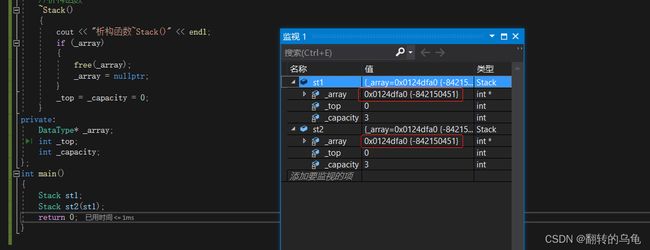
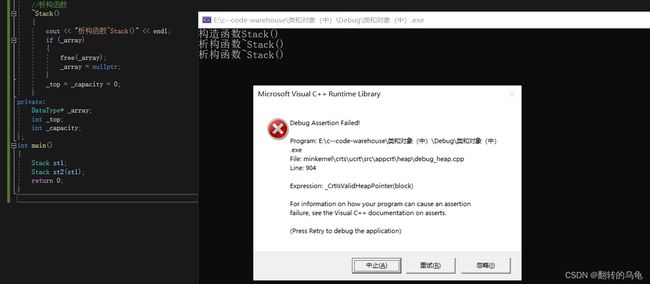
当编译器自动生成的默认拷贝构造函数进行初始化栈时,我们发现两个对象中的_array指针竟然指向了同一块空间。这是因为编译器默认生成的拷贝构造函数拷贝数据时,是按照byte进行拷贝的,那么拷贝的时候自然也会将st1的地址拷贝给st2,这就导致了st2和st1指向了同一块空间。当主函数结束的时候,需要调用析构函数来销毁两个对象,但是由于两个对象中的_array都指向了同一块空间,所以导致了同一块空间被释放了两次。
这种情况不仅析构两次有问题,而且在插入数据时,一个对象的改变必然会覆盖另一个对象的数据,所以这种浅拷贝的问题会造成严重的后果,那么我们应该如何避免这种情况的发生呢?这个时候我们就得写一个深拷贝拷贝构造函数了。
Stack(const Stack& s)
{
_array = (DataType*)malloc(sizeof(DataType) * s._capacity);
if (!_array)
{
perror("malloc fail::");
exit(-1);
}
_top = s._top;
_capacity = s._capacity;
}
所以我们什么时候需要写拷贝构造函数呢?很简单,如果类中有资源申请我们就必须手动实现拷贝构造函数。如果没有的话那就直接使用类提供的默认拷贝构造即可。
拷贝构造函数典型调用场景:
- 使用已存在对象创建新对象
- 函数参数类型为类类型对象
- 函数返回值类型为类类型对象
五、赋值运算符重载
5.1、运算符重载
C++为了增强代码的可读性引入了运算符重载,运算符重载是具有特殊函数名的函数,也具有其返回值类型,函数名字以及参数列表,其返回值类型与参数列表与普通的函数类似。
函数名字:关键字operator后面接需要重载的运算符符号。
函数原型:返回值类型 operator操作符(参数列表)
对于运算符的重载我们需要注意几点:
- 不能通过连接其他符号来创建新的操作符:比如operator@
- 重载操作符必须有一个类类型参数
- 用于内置类型的运算符,其含义不能改变,例如:内置的整型+,不能改变其含义
- 作为类成员函数重载时,其形参看起来比操作数数目少1,因为成员函数的第一个参数为隐藏的this
.*::sizeof?:.注意以上5个运算符不能重载。这个经常在笔试选择题中出现。
具体使用: 类内成员函数
class Date
{
public:
Date(int year = 1900, int month = 1, int day = 1)
{
_year = year;
_month = month;
_day = day;
}
//bool operator==(Date* this, const Date& d2)
// 这里需要注意的是,左操作数是this,指向调用函数的对象
bool operator==(const Date & d2)
{
return _year == d2._year
&& _month == d2._month
&& _day == d2._day;
}
private:
int _year;
int _month;
int _day;
};
void Test()
{
Date d1(2018, 9, 26);
Date d2(2018, 9, 27);
cout << d1.operator==(d2)<< endl;
}
int main()
{
Test();
}
也可以类外定义 但需要传入两个参数 类内传一个参数是因为类内成员默认有一个参数this指针,指向对象自身,所以传一个
// 全局的operator==
class Date
{
public:
Date(int year = 1900, int month = 1, int day = 1)
{
_year = year;
_month = month;
_day = day;
}
//private:
int _year;
int _month;
int _day;
};
// 这里会发现运算符重载成全局的就需要成员变量是公有的,那么问题来了,封装性如何保证?
// 这里其实可以用我们后面学习的友元解决,或者干脆重载成成员函数。
bool operator==(const Date& d1, const Date& d2)
{
return d1._year == d2._year
&& d1._month == d2._month
&& d1._day == d2._day;
}
void Test()
{
Date d1(2018, 9, 26);
Date d2(2018, 9, 27);
cout << operator==(d1,d2)<< endl;
}
int main()
{
Test();
} //运行结果自然也是0
//由于是类外的函数,必须设置成员为public 或者 设置友元函数 本例为设置public
上面的是设置属性为public
5.2、赋值运算符重载
1. 赋值运算符重载格式
- 参数类型:const T&,传递引用可以提高传参效率
- 返回值类型:T&,返回引用可以提高返回的效率,有返回值目的是为了支持连续赋值
- 检测是否自己给自己赋值
- 返回*this :要复合连续赋值的含义
class Date
{
public:
Date(int year = 1900, int month = 1, int day = 1)
{
_year = year;
_month = month;
_day = day;
}
Date(const Date& d)
{
_year = d._year;
_month = d._month;
_day = d._day;
}
Date& operator=(const Date& d)
{
if (this != &d)
{
_year = d._year;
_month = d._month;
_day = d._day;
}
return *this;
}
void Print()
{
cout << _year << " " << _month << " " << _day << endl;
}
private:
int _year;
int _month;
int _day;
};
int main()
{
Date d1(2022, 10, 4);
Date d2 = d1;
d1.Print();
d2.Print();
}
2. 赋值运算符只能重载成类的成员函数不能重载成全局函数
原因:赋值运算符如果不显式实现,编译器会生成一个默认的。此时用户再在类外自己实现
一个全局的赋值运算符重载,就和编译器在类中生成的默认赋值运算符重载冲突了,故赋值
运算符重载只能是类的成员函数
3. 用户没有显式实现时,编译器会生成一个默认赋值运算符重载,以值的方式逐字节拷贝。
注意:内置类型成员变量是直接赋值的,而自定义类型成员变量需要调用对应类的赋值运算符
重载完成赋值。
有必要,如果是一般的类自然自动生成的可以实现,但是如果类内管理者堆中的资源的话,必须自己实现,以便于完成资源的赋值,而不是指向同一块空间,导致程序崩溃。
5.3、前置++运算符和后置++运算符重载
// 前置++:返回+1之后的结果
// 注意:this指向的对象函数结束后不会销毁,故以引用方式返回提高效率
Date& operator++()
{
_day += 1;
return *this;
}
// 后置++:
// 前置++和后置++都是一元运算符,为了让前置++与后置++形成能正确重载
// C++规定:后置++重载时多增加一个int类型的参数,但调用函数时该参数不用传递,编译器动传递
// 注意:后置++是先使用后+1,因此需要返回+1之前的旧值,故需在实现时需要先将this保存份,然后给this + 1
// 而temp是临时对象,因此只能以值的方式返回,不能返回引用
Date operator++(int)
{
Date temp(*this);
_day += 1;
return temp;
}
案例始终有所瑕疵,并不规范,比如传入 2022 14 55,代码仍会执行,但现实中并不存在这样的日期,仅供参考!!!
六、日期类完整代码
以下为完整代码:
Date.h
#pragma once
#pragma once
#includeDate.cpp
#define _CRT_SECURE_NO_WARNINGS
#include"Date.h"
//构造函数
Date::Date(int year, int month, int day)
{
assert(month < 13 && day <= GetMonthDay(year, month));
_year = year;
_month = month;
_day = day;
}
//获取某个月的天数
int Date::GetMonthDay(int year, int month)
{
assert(month > 0 && month < 13);
int arr[13] = { 0,31,28,31,30,31,30,31,31,30,31,30,31 };
if (month == 2 && (((year % 4 == 0) && (year % 100 != 0)) || (year % 400 == 0)))
{
return 29;
}
return arr[month];
}
//打印函数
void Date::Print()const
{
cout << _year << "年" << _month << "月" << _day << "日" << endl;
}
//重载==运算符
bool Date::operator==(const Date& d)const
{
return (_year == d._year && _month == d._month && _day == d._day);
}
//重载!=运算符
bool Date::operator!=(const Date& d)const
{
return !(*this == d);
}
//重载<运算符
bool Date::operator<(const Date& d)const
{
return (_year < d._year)
|| ((_year == d._year) && (_month < d._month))
|| ((_year == d._year) && (_month == d._month) && (_day < d._day));
}
//重载<=运算符
bool Date::operator<=(const Date& d)const
{
return (*this == d) || (*this < d);
}
//重载>运算符
bool Date::operator>(const Date& d)const
{
return !(*this <= d);
}
//重载>=运算符
bool Date::operator>=(const Date& d)const
{
return !(*this < d);
}
//重载+=运算符
Date& Date::operator+=(int d)
{
if (d < 0)
{
return *this -= -d;
}
_day += d;
while (_day > GetMonthDay(_year, _month))
{
_day -= GetMonthDay(_year, _month);
_month++;
if (_month > 12)
{
_year++;
_month = 1;
}
}
return *this;
}
//重载+运算符
Date Date::operator+(int d)const
{
Date tmp(*this);
tmp += d;
return tmp;
}
//重载-=运算符
Date& Date::operator-=(int d)
{
if (d < 0)
{
return *this += -d;
}
_day -= d;
while (_day <= 0)
{
_month--;
if (_month == 0)
{
_year--;
_month = 12;
}
_day += GetMonthDay(_year, _month);
}
return *this;
}
//重载-运算符
Date Date::operator-(int d)const
{
Date tmp(*this);
tmp -= d;
return tmp;
}
//重载d1-d2运算符
int Date::operator-(const Date& d)const
{
Date max = *this;
Date min = d;
int flag = 1;
if (*this < d)
{
max = d;
min = *this;
flag = -1;
}
int cout = 0;
while (min != max)
{
++min;
++cout;
}
return cout * flag;
}
//重载前置++
Date& Date::operator++()
{
*this += 1;
return *this;
}
//重载后置++
Date Date::operator++(int)
{
Date tmp(*this);
*this += 1;
return tmp;
}
//重载前置--
Date& Date::operator--()
{
*this -= 1;
return *this;
}
//重载后置--
Date Date::operator--(int)
{
Date tmp(*this);
*this -= 1;
return tmp;
}
//将一年中的第几天转换成日期
void Date::DaysToDate()
{
int year = 0;
int days = 0;
cin >> year >> days;
static int Day[13] = { 0, 31, 28, 31, 30, 31, 30, 31, 31, 30, 31, 30, 31 };
if (((year % 4 == 0 && year % 100 != 0) || (year % 400 == 0))
&& (days > 60))
{
--days;
}
int month = 1;
while (days > Day[month])
{
days -= Day[month];
month++;
}
printf("%04d-%02d-%02d\n", year, month, days);
}
//计算日期是一年中的第几天
int Date::DayOfYear() const
{
static int Day[13] = { 0, 31, 59, 90, 120, 151, 181, 212, 243, 273, 304, 334, 365 };
int n = Day[_month - 1] + _day;
if (_month > 2 && ((_year % 4 == 0 && _year % 100 != 0) || (_year % 400 == 0)))
++n;
return n;
}
int main()
{
Date d1(2022, 10, 2);
d1.Print();
cout << endl;
cout <<"是当年的"<< d1.DayOfYear() << "天" << endl;
d1.DaysToDate();
}
七、const成员函数
将const修饰的“成员函数”称之为const成员函数,const修饰类成员函数,实际修饰该成员函数隐含的this指针,表明在该成员函数中不能对类的任何成员进行修改。
const对象只能调用const成员函数
非const对象既可以调用const成员函数 也可以调用非const 成员函数
八、取地址及const取地址操作符重载
取地址操作符重载也属于我们类的六个默认成员函数之一,所以平常当我们访问对象的地址时,类也会给我们提供对应的的默认成员函数,所以一般情况下我们都不需要对取地址操作符重载。
class A
{
public:
void Print() const
{
cout << _a << endl;
}
A* operator&()
{
return this;
}
const A* operator&() const
{
return this;
}
private:
int _a = 10;
};
这两个运算符一般不需要重载,使用编译器生成的默认取地址的重载即可,只有特殊情况,才需
要重载,比如想让别人获取到指定的内容!

